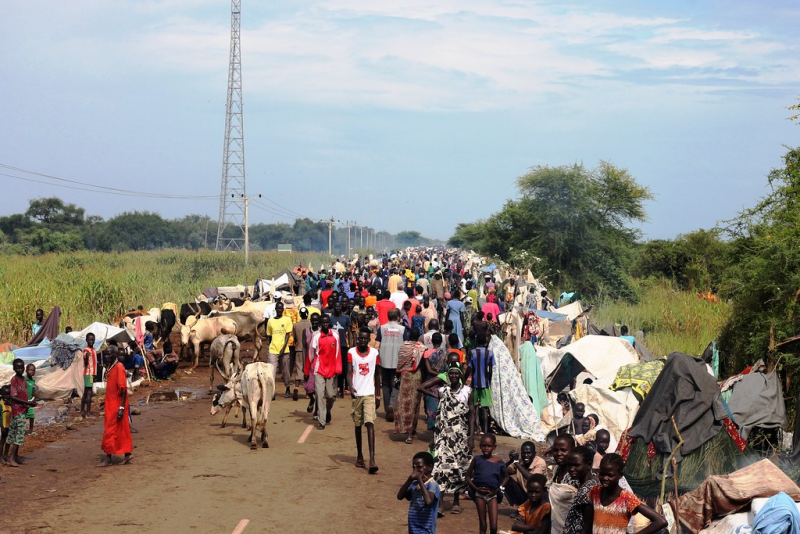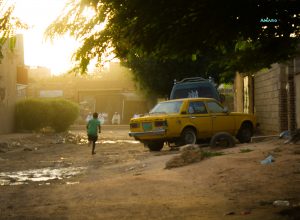
The country of Sudan has been faced with an ongoing Civil War that began to see violence since the middle of April. The conflict as a whole has caused not only untold deaths, displacement, and destruction of property all across Sudan and its major cities like Dafour or Bahri, but it has also caused access to some of the most basic necessities like food and water to be restricted due to the infighting among Sudan’s most powerful forces.
“Even rich people can’t buy food,” says Mahmood Ahmed, a mechanical engineer and university teaching assistant that RaiseTheVoices has interviewed from the Kafouri neighborhood of Bahri in Khartoum state located in Northern Sudan.
How this conflict began, while it has been said to extend for decades, was due to recent issues at the conclusion of a revolt in early 2019 that saw the former leader of Sudan, Omar al-Bashir, overthrown. His government was deemed Authoritarian over the restrictions imposed by citizens to rival political groups that cemented al-Bashir’s rise of power. Due to the number of independent groups and surrounding controversy of the government, many prominent groups began forming and mobilizing support to seek al-Bashir’s downfall. In particular, the paramilitary group known as the Rapid Support Forces (RSF) who collaborated with al-Bashir’s own Sudan Armed Forces (SAF) in a coup d’etat. This subsequently caused the government to experience a transitional phase that lasted until 2021.
Post 2019 Sudan saw the creation of a transitional government that was initially supported by both the RSF and the SAF that saw citizens have more power to participate in. The new government was seen to be Democratic as a Prime Minister was elected directly by the people and a constitution was created to establish rights and principles of civilians. However, this government would not last long as in 2021 the two groups, again, staged a coup d’etat against the transitional government and now tensions loom over their control of the region. Disagreements began almost immediately over which group would be seen as the leader of the country and while the head of the SAF General Abdel Fattah al-Burhan is currently seen as the de-facto leader of Sudan, the RSF’s General Mohamed Hamdan Dagalo disagrees and the two sides have remained in a power struggle.
The fighting has taken place over key areas near the presidential palace and various cities that have RSF camps stationed near the homes of civilians where they in particular are most vulnerable. This has caused many to either flee their homes or die from the ongoing conflict.

The amount of devastation faced by the average civilian living in Sudan due to the infighting among the two forces has unfortunately gotten worse. According to Ahmed, people in areas away from the fighting generally have access to food, water, electricity, while limited, during the hours when fighting is happening, and access to only a few pharmacies. However the people of Bahri do not share the same fate. Due to much of the fighting, areas in Bahri have experienced widespread shortage of not only medical access for the average civilian but also that of water and electricity, where many reported a shortage lasting for up to two weeks. Even the cellular networks across the region have become unstable as only one network is currently available for use, with reportedly very bad reception; limiting citizens’ access to information. Ahmed has also unfortunately reported seeing corpses of civilians still laying on the streets and in cars across the different areas where fighting has happened.
As for the possibility of being able to buy food even when it is currently available, Ahmed says: “One problem that isn’t highlighted enough right now is the lack of cash, with payment apps not working at the moment”, which affects both the rich and poor alike in still being able to access food supplies for themselves and their families.
Ahmed was in his neighborhood close to the RSF (Rapid Support Forces)’ camp in Kafouri when fighting broke out last month. “I was driving my car going to work in Kafouri-bahri when the fighting started. I almost crashed into one of the RSF cars as they were exiting their camp. The fighting had been expected a week before it started due to the heavy militarization of Khartoum since April 10th.”
Khartoum is generally quiet at the moment with a few hotspots of fighting near the presidential palace and military complex, with frequent aerial bombing that start early in the morning and go on through the afternoon. On May 15th, the LA Times reported some 600 deaths and thousands of injuries with hundreds of thousands displaced including Ahmed who fled to Omdurman. This amount is specifically staggering as about 200 thousand were forced to flee to neighboring countries and about 700 thousand more were forced to flee their homes and are currently displaced within Sudan. These have caused worrisome signs of triggering a humanitarian crisis that can have the potential of not only causing further displacement but a greater migration of people to neighboring states and impact the stability of the region.

With much disagreement about what started the fighting and who exactly is to blame, most people generally agree that leaders on both sides of the conflict need to compromise; especially the military. According to Ahmed, people generally believe that some sort of compromise is possible but many also hope that the RSF will be defeated. Everyone, though, just wants the fighting to stop and the war to end.
In the meantime, Sudanese citizens like Ahmed need help and are hoping that the international community can assist. Ahmed particularly hopes that global leaders can broker a ceasefire that allows the people in Khartoum to get access to humanitarian relief, for enough international pressure to make both sides of the conflict agree on a permanent cease fire, and broker an exit of military forces, especially those of the RSF, from civilian areas.
In the near future, Ahmed hopes for the return of essential services including communication and the mobile banking infrastructure of which many in the area depend on in order to acquire basic necessities. Talks for some sort of compromise on this conflict have continued in neighboring Jeddah, Saudi Arabia. Both parties signed what’s known as a Declaration of Commitment to allow humanitarian aid in the country but there is currently no end in sight for the conflict.



Be First to Comment